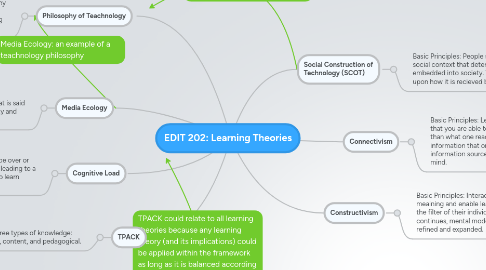
1. Media Ecology
1.1. Basic Principles: The media, including its very presence, structure, process, and the way that we use it, affects what is said and how that which is said shapes and changes our society and everyone within it.
1.1.1. Implications for Education: Technology is an aspect of society that must be adressed in the field of education because is is prevalent in the every day lives of learners. This prevalence encourages educators to embrace new technology and work with the applications that it has to offer.
2. Cognitive Load
2.1. Basic Principles: Processing infromation can be over or under stimulating for one's working memory, leading to a possible loss of motivation and the inability to learn effectively.
2.1.1. Implications for Education: Educators should work to decrease the cognitive load on learnes as much as possible. Measures to decrease the load could include layout and organization of text, providing topic summaries, chunking, and branched lessons for groups of learners.
3. TPACK
3.1. A fusion of three types of knowledge: technological, content, and pedagogical.
3.1.1. The merging of these three aspects of teaching is developed over time, every lesson can have a different balance of TPACK , and the theory may be applied differently to various subjects and lessons.
4. Philosophy of Teachnology
4.1. This philosophy adds another aspect of an eductor's philosophy of teaching: beliefs or framework detailing technology's place within the classroom as well as teaching practices and learning process.
4.1.1. It's a good idea to include a seperate philosophy of teachnology statement along with a philosophy of teaching document.
5. Connectivism
5.1. Basic Principles: Learning is about the connections that you make, the resources that you are able to access, the networks that you join and make use of rather than what one readily knows. It is more important to know how to get the information that one seeks, judge content, see connections between multiple information sources,and be willing to learn than being able to call information to mind.
5.1.1. Implications for Education: Teachers are expected to stay current with technology in order to design lessons relating to technology, social media etc. A new environment has to be developed in the classroom, one of exploration rather than set lessons. Material provided by the educator must be highly relevant in order to motivate learners to continue the learning process.
6. Constructivism
6.1. Basic Principles: Interacting with the environment creates connections that build meaining and enable learning. Each learner derives meaning in the world through the filter of their individual perception. As interaction with an environment continues, mental models and interpretations of reality will be reconstructed, refined and expanded.
6.1.1. Implications for Education: The teacher is a facilitator who introduces complex learning materials that can be broken down into more basic chunks, embedded into real life contexts, and experienced. Learning can be influenced by life experience while collaboration, discovery, testing and active learning are applied to each learning situation.
7. Social Construction of Technology (SCOT)
7.1. Basic Principles: People shape technology. It is people and/or a social context that determine how a technology is utilized and embedded into society. Technology's success or failure is based upon how it is recieved by certain groups.
7.1.1. Implications for Education: Educators can use technology as a tool that they interpret and use in any way they want to in order to improve the experience/ process of learning.
